Stuart Forster showcases his Indian Premier League cricket photography.
I photographed at the opening game of the Indian Premier League (IPL). Cricket has changed significantly in the intervening years.
Much has changed in the sport since 2008, when the inaugural Indian Premier League match was staged at the packed M. Chinnaswamy Stadium in Bengaluru, India. The IPL has been a catalyst to spawning franchise-based cricket leagues elsewhere in the world, popularising the Twenty20 version of cricket as well as revolutionising the sport and popular perceptions of it.
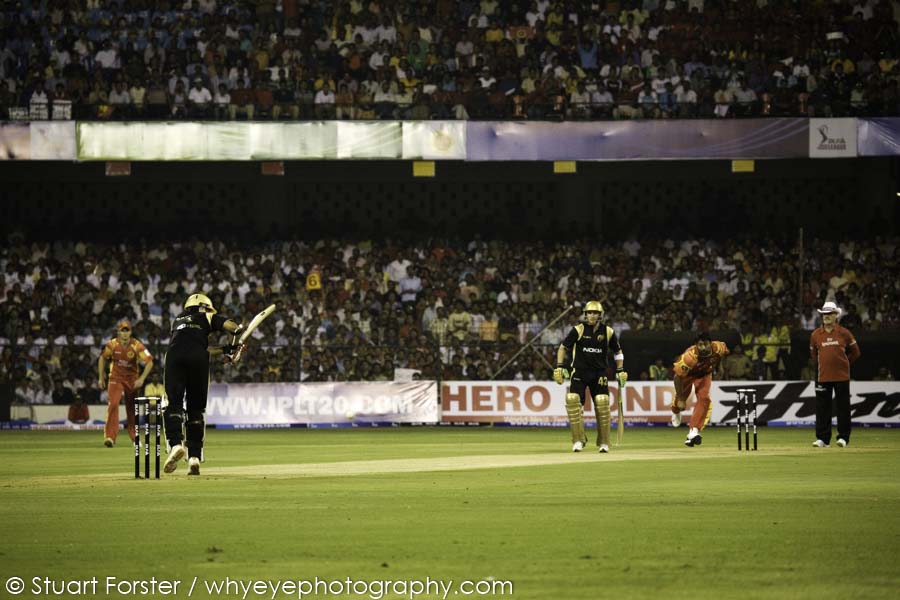
The opening ball in Indian Premier League cricket.
Indian Premier League cricket photography
The IPL acronym is recognised by sports fans worldwide. Games are broadcast live on television around the globe. Yet during a matchday, nothing beats the spine-tingling sensation of being in a stadium or on a pitch, in front of a packed stand of fans cheering their team.
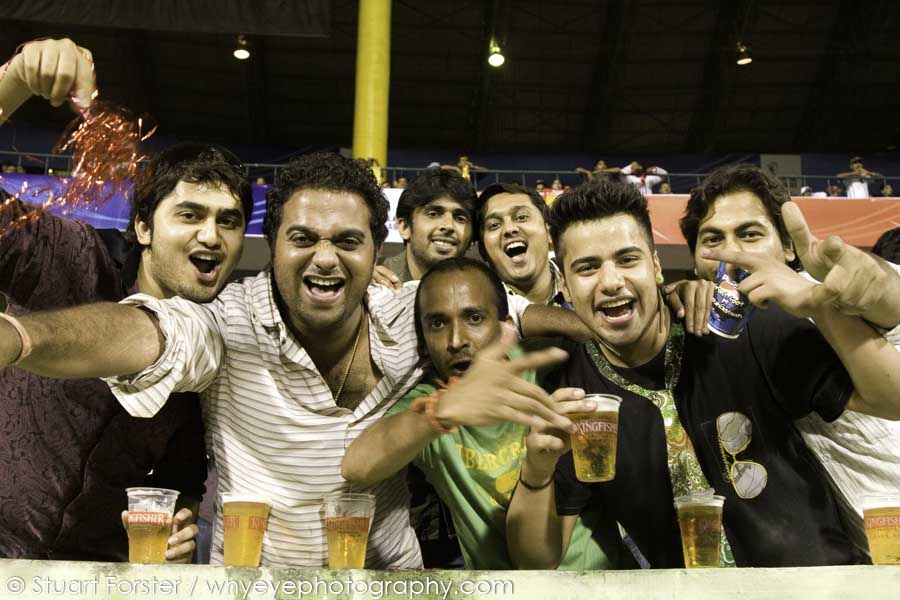
Fans, among the 55,000 sell-out crowd at the IPL’s opening game.
Prior to the advent of the Indian Premier League who would have imagined cheerleaders dancing by a boundary rope during a game of cricket? That was something associated with American sports.
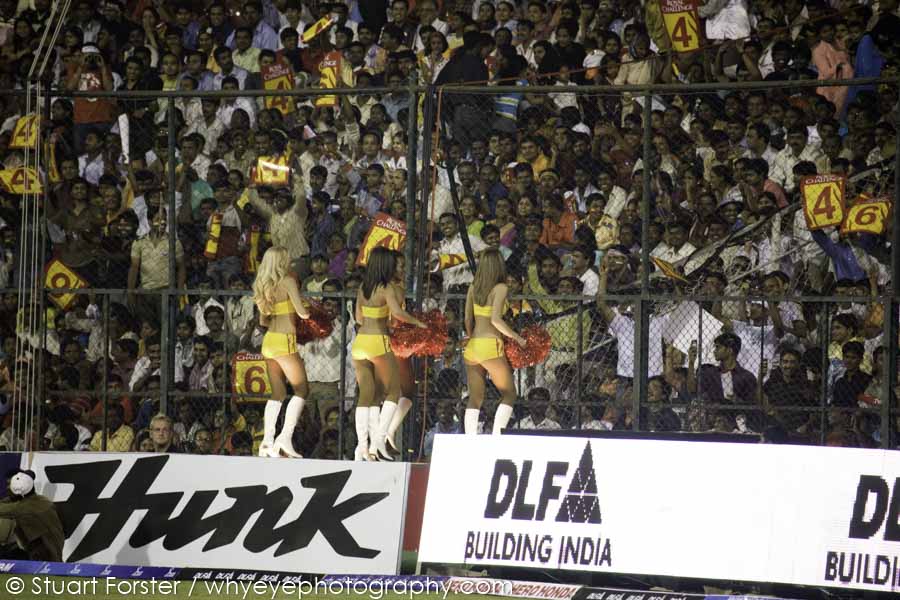
Cheerleaders entertaining the crowd at the packed M. Chinnaswamy Stadium.
Of course, major cricket matches in India have long animated spectators but, hand on heart, would anyone other than the most ardent and optimistic of fans really have expected the IPL to blossom in the way that it has?
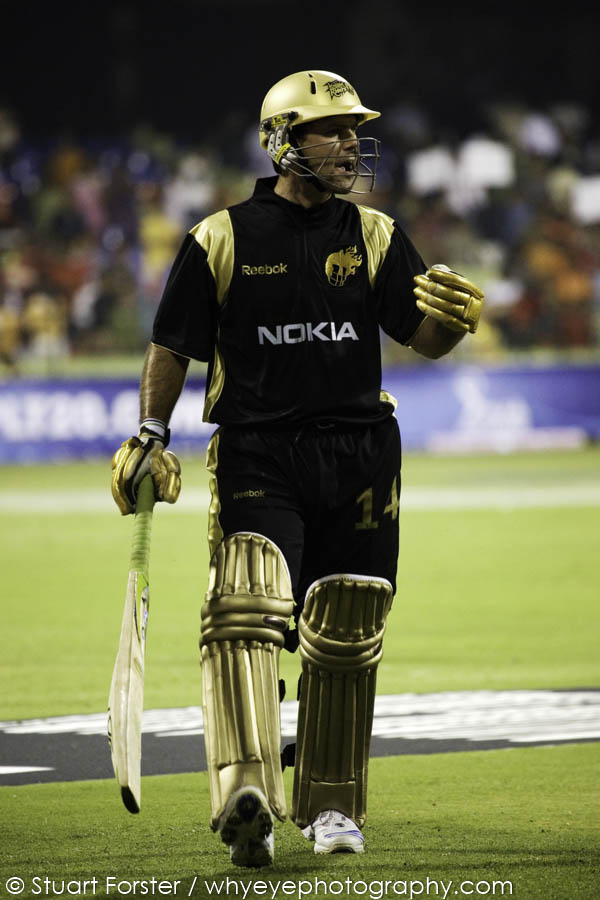
Australian Ricky Ponting of the Kolkata Knight Riders walks from the field after being dismissed in the opening IPL fixture.
The Board of Control for Cricket in India (BCCI) announced the advent of the IPL in 2007. Lessons were learnt from the marketing of the English Premier League and several ideas were adopted and adapted from North American sporting leagues. Cricket fans learnt that the IPL was to be franchise based. Franchises’ squads would have to operate within a salary cap. Mirroring the player drafts which create a buzz of publicity and excitement ahead of the football, basketball, ice hockey and baseball seasons, IPL players would be signed via an auction.
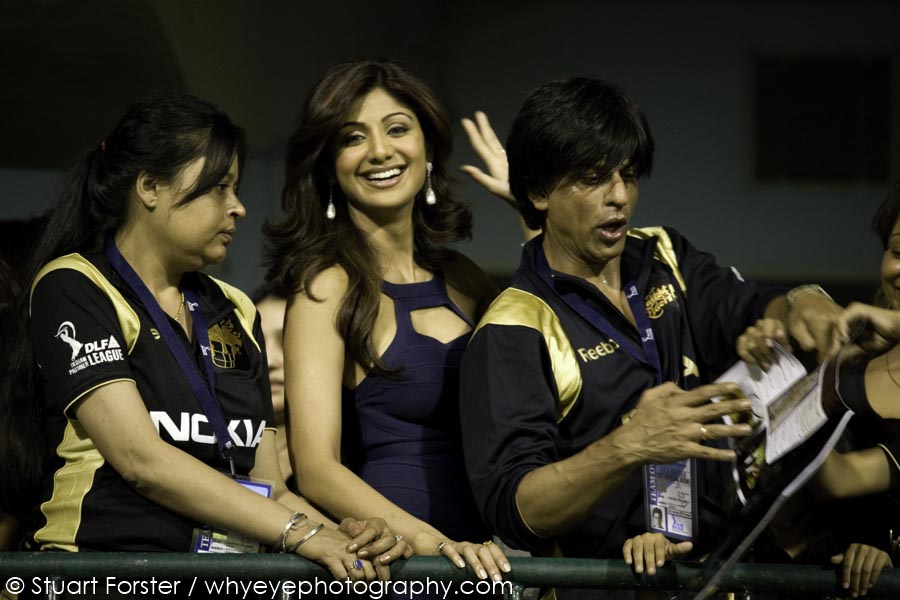
Movie stars Shilpa Shetty (left) and Shah Rukh Khan (right) at the opening Indian Premier League (IPL) cricket match.
Evolution of the IPL
In a sport then seeing negligible attendances for domestic matches around the world, the BCCI’s approach to the IPL was nothing short of revolutionary. Traditionalists gasped and tutted. Doubters mocked and questioned why anyone would anyone consider introducing Americanisms to the beloved game of cricket. Traditions were, after all, a fundamental part of the game. Others cast doubts on the timing of the window mooted for the IPL and saw it as a potential disruptor to the established cricketing calendar. Some, though, comprehended the vast potential of the underlying passion for cricket in India, believing that the rapidly modernising nation was ready for a dynamic domestic league which included the cream of international talent.
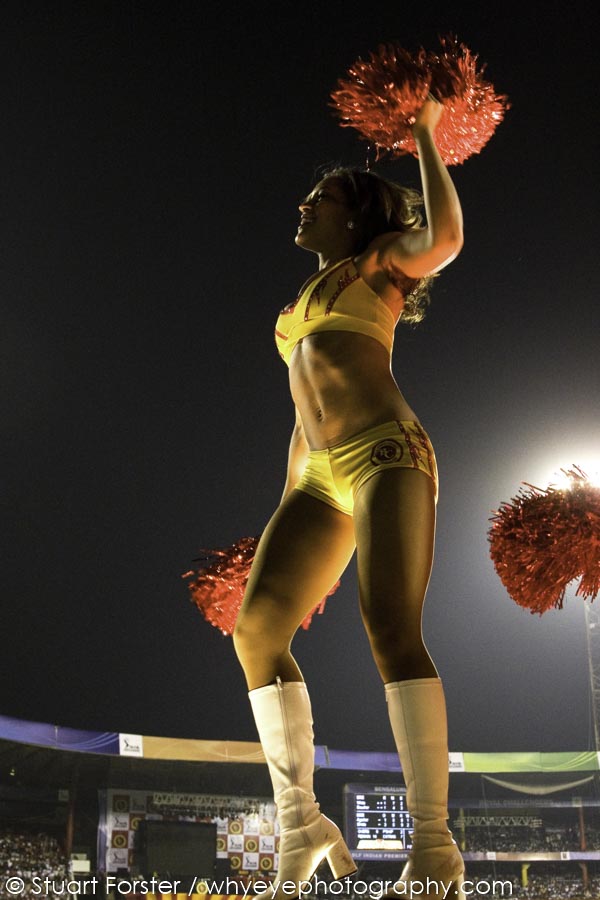
Cheerleaders at a cricket game? The idea once seemed unworkable to traditionalists.
The Twenty20 World Cup
Twelve years ago cricket aficionados were divided as to whether the nascent 20-over format promised to be the sport’s saviour or its downfall. In 2007 India won the first Twenty20 World Cup, held in South Africa, defeating Pakistan in the final. There was a buzz — and some controversy — relating to the establishment Indian Cricket League, the ICL, which featured teams from India, Pakistan and Bangladesh along with a World XI. That league proved short-lived.
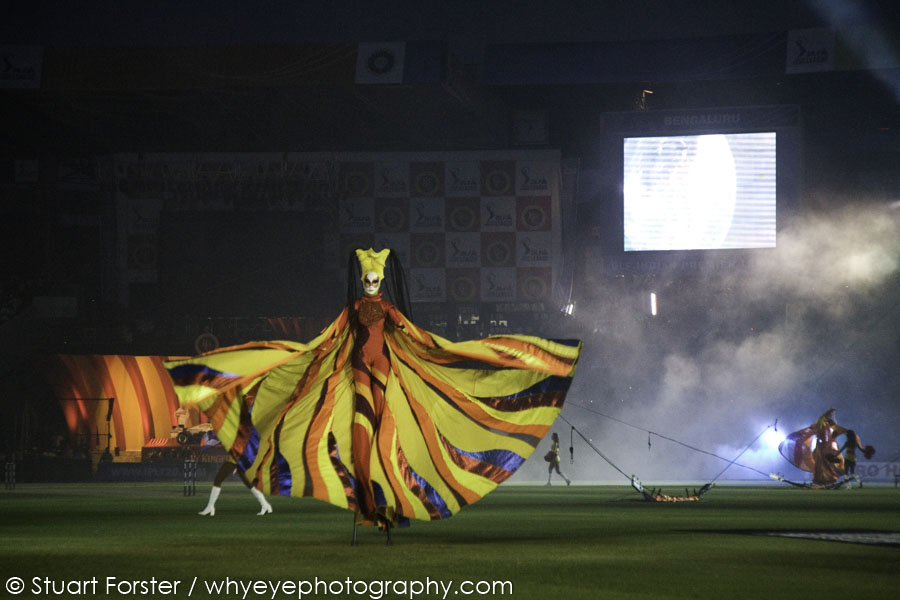
A stilt walker provides part of the entertainment in Bangalore at the opening ceremony of the Indian Premier League (IPL).
Was there even a need for T20 cricket? There were those who believed the 50-over format of One Day Internationals (ODIs) was exciting enough while traditionalists felt that even ODIs had become too prevalent and detracted from Test cricket — the game’s purest form. Others expressed the viewpoint that a significantly shorter, television-friendly version of cricket had the potential to attract a new audience, inject money from television revenue and consequently reinvigorate the sport.

A groundsman trims the grass of the outfield at the M. Chinnaswamy Stadium while cheerleaders go through their routine.
Showtime with Shah Rukh Khan
Movie stars and wealthy business people bid for IPL franchises, for which a minimum of $50 million was set. The talk of multi-million dollar cricket franchises coupled with showbusiness razzmatazz drew the attention of news networks in India and beyond. For a little over $75 million, Shah Rukh Khan’s Red Chillies Entertainment won control of the franchise that became the Kolkata Knight Riders. Preity Zinta was involved in the consortium that won a franchise for Mohali — the Kings XI Punjab. The most expensive franchise, costing $111.9 million, was bought by Reliance India Limited and became the Mumbai Indians.
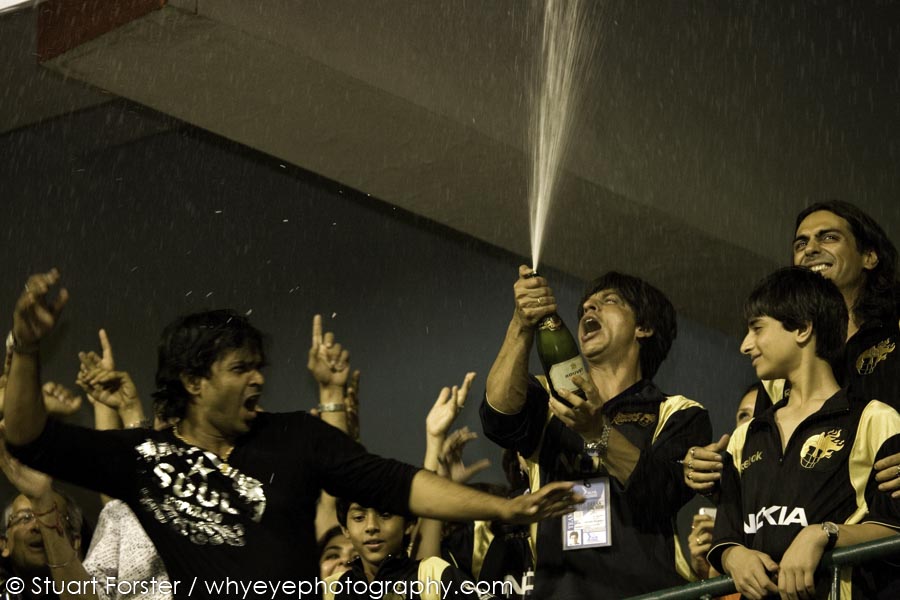
A Champagne moment? Movie star Shah Rukh Khan pops a bottle of bubbly to celebrate the Kolkata Knight Riders’ victory in the opening IPL game.
The first IPL fixture
I had the honour of photographing at the very first IPL game, on 18 April 2008, when the Royal Challengers Bangalore hosted the Kolkata Knight Riders. In addition to widespread domestic press coverage, foreign publications clamoured for reports of the game. They were interested in the public’s reaction to the new franchise-based concept.
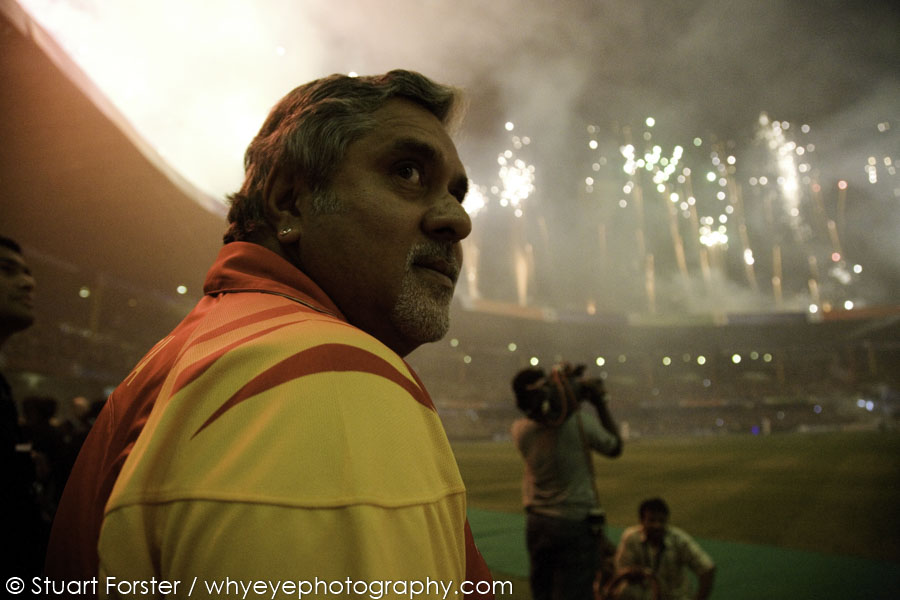
Dr Vijay Mallya, who owned the Bangalore Royal Challengers franchise when the Indian Premier League started.
The first season of the IPL featured international players such as Shane Warne (Rajasthan Royals), Dwayne Bravo (Mumbai Indians) and Shaun Marsh (Kings XI Punjab). Indian stars including Rahul Dravid (Royal Challengers Bangalore), MS Dhoni (Chennai Super Kings), Gautam Gambir (Delhi Daredevils) and S. Sreesanth (Rajasthan Royals) also participated. Part of the excitement was because top players had opportunities to sign lucrative contracts.
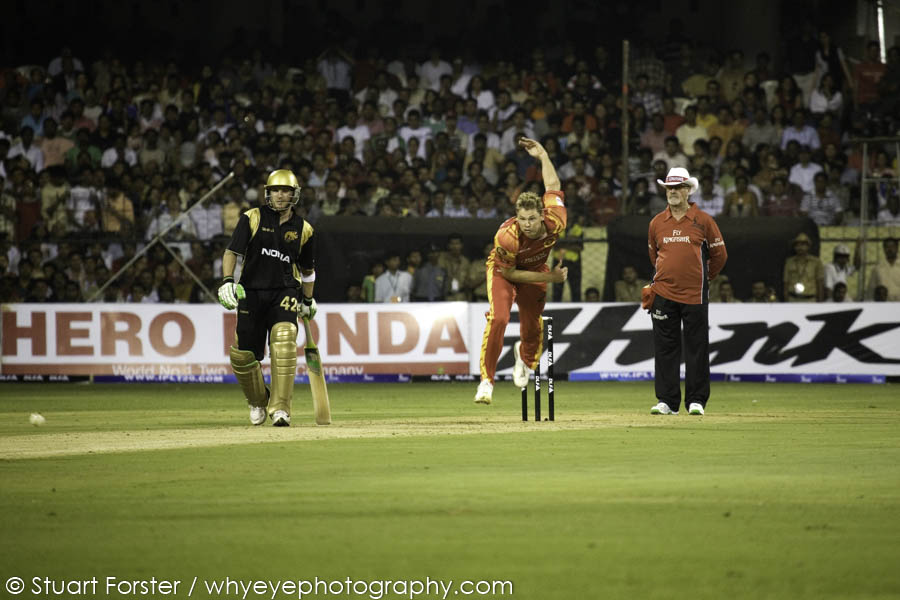
Action from the opening fixture of the Indian Premier League.
Journalists from around the world
Journalists from top London-based newspapers sat in the press box ahead of the game and Wisden, the cricket magazine, sent a correspondent. One of my photos of the Royal Challengers’ cheerleaders dancing in front of a packed stand made it into the next day’s Washington Post newspaper in the USA. During the National Football League (NFL) season, the same group of cheerleaders performed at Washington Redskins games.
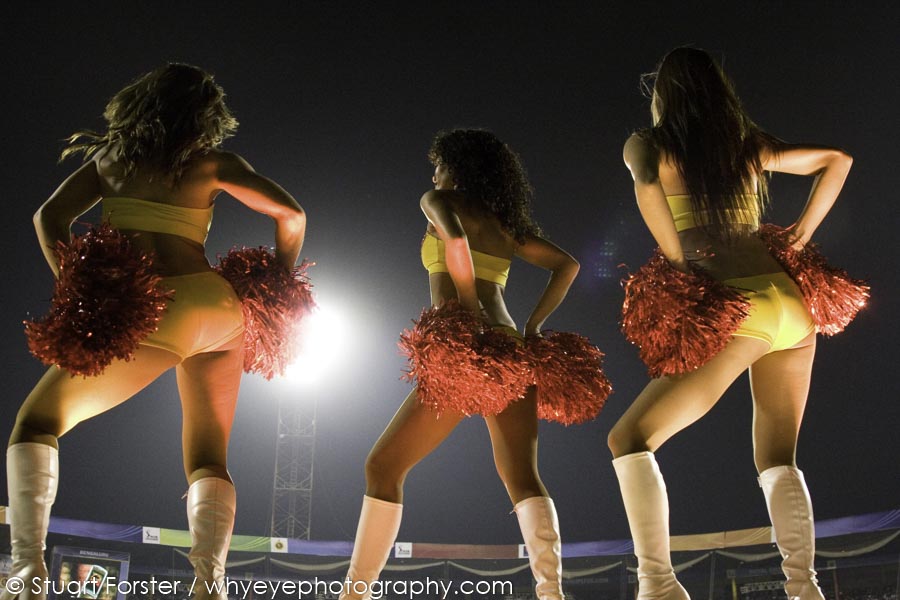
Cheerleaders from the Washington Redskins of the National Football League (NFL) dance and entertain the crowd.
My photographs were also published in newspapers in Australasia. New Zealander Brendan McCullum smashed a world record 158 not out playing alongside Australia captain Ricky Ponting.
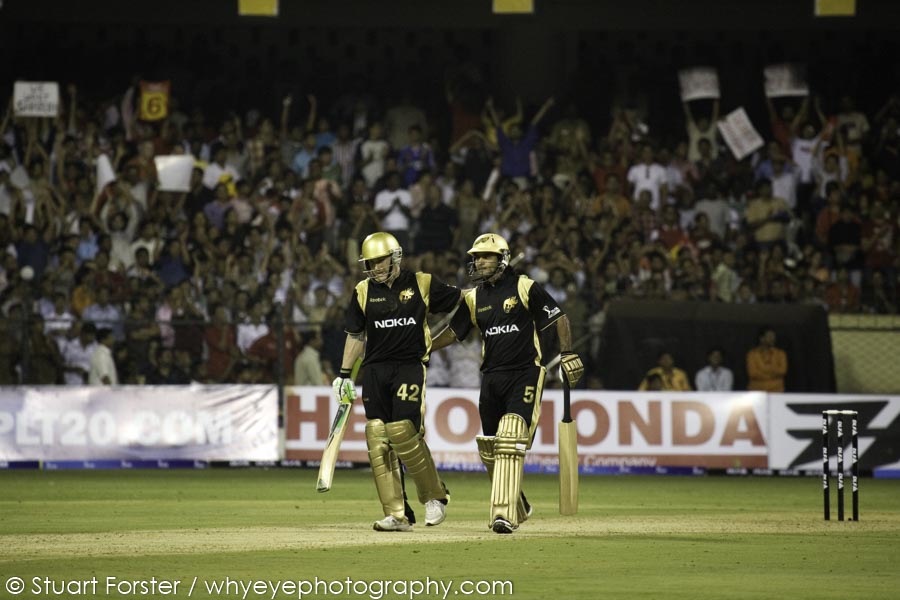
Brendan McCullum of the Kolkata Knight Riders receives congratulations after scoring a boundary while establishing a record individual score in Twenty20 cricket.
Fireworks fizzed in the night sky during an opening extravaganza that featured a performance by acrobats from the Cirque du Soleil. Fans cheered on the players and interacted with movie stars Shah Rukh Khan and Shilpa Shetty. SRK danced in the stands, waving at fans. Cricket had been reinvented and taken to a new level.
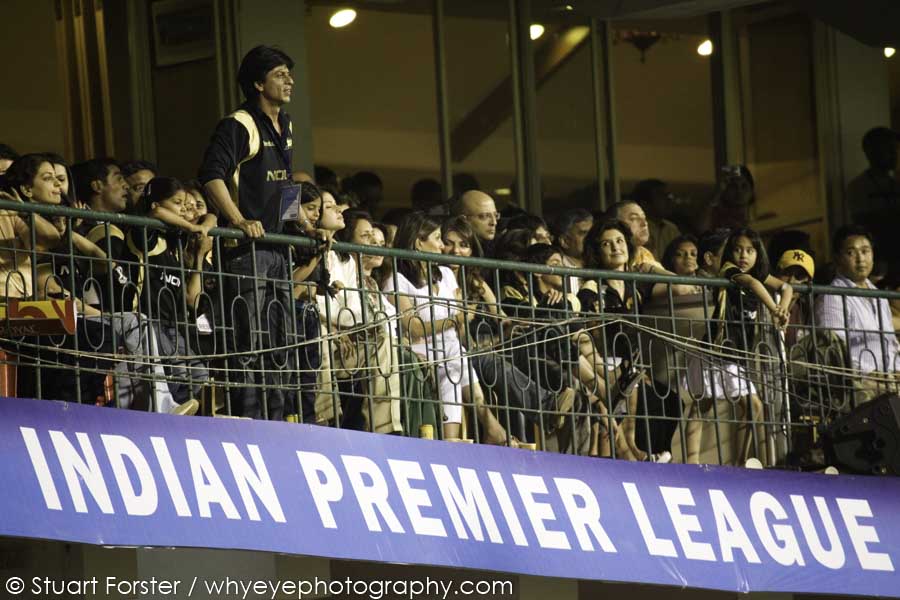
Movie star Shah Rukh Khan – one of the franchise owners in the new Indian Premier League (IPL).
A popular sporting success
Statistics collated in June indicate that the average attendance at IPL matches is the fifth highest of all the professional sporting leagues in the world. The average crowd size of 28,830 at Major League Baseball games — played in the United States and Canada — is eclipsed by that of the IPL, which pulls 32,800. Only games played in the USA’s National Football League, Germany’s Bundesliga, England’s Premier League and the AFL, the Australian Football League, draw higher average attendances.
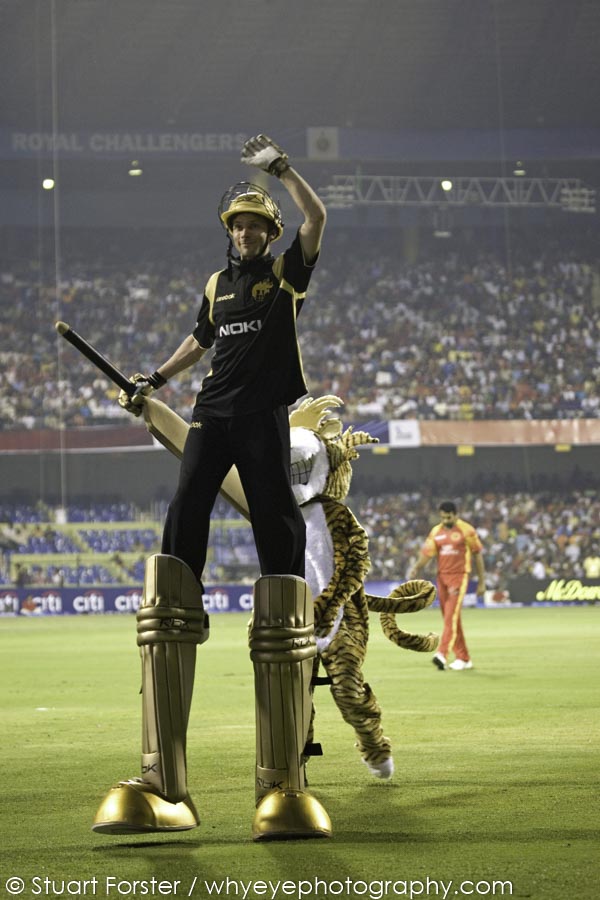
Stilt walkers are part of the entertainment in Bangalore at the opening ceremony, before the first match of the Indian Premier League (IPL).
Would franchise-based cricket leagues have taken off elsewhere in the world without the IPL showing the way? Australia’s Big Bash League was founded in 2011. In 2016 80,883 people packed the Melbourne Cricket Ground for a match between the Melbourne Stars and Melbourne Renegades. In 2013 the Caribbean Premier League was established, followed by the Pakistan Super League two years later.
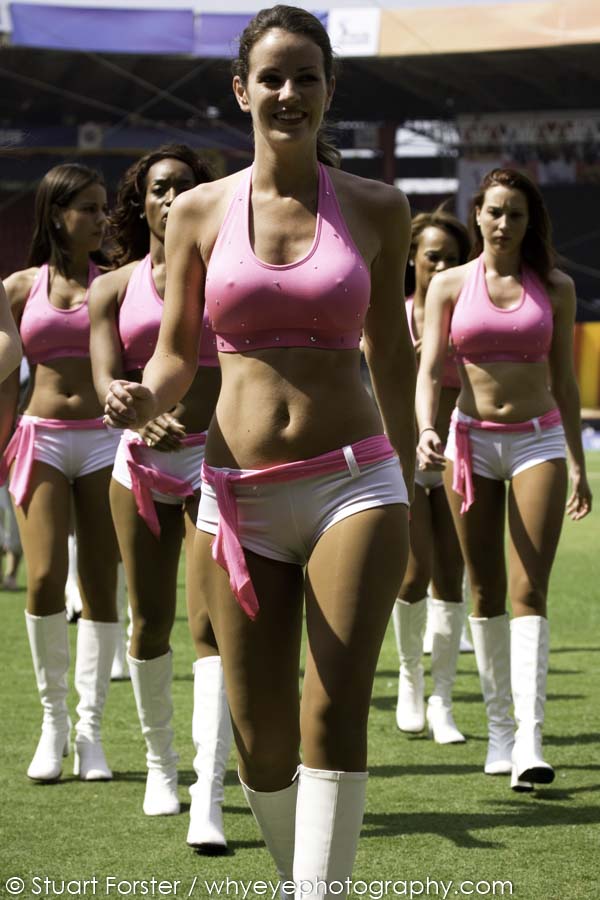
A cheerleader smiles while practising at the M. Chinnaswamy Stadium ahead of the opening IPL fixture.
The future of IPL cricket
Twenty20, or T20 as it’s so often termed, appears to be a success. Two new franchises are set to join the existing eight for the thirteenth season of the Indian Premier League, IPL13, to be played next year. Superstitious folk are inclined to eye the number thirteen with caution. Yet there appears no reason to view the forthcoming thirteenth edition of the IPL with concern; things have never looked brighter for the league.
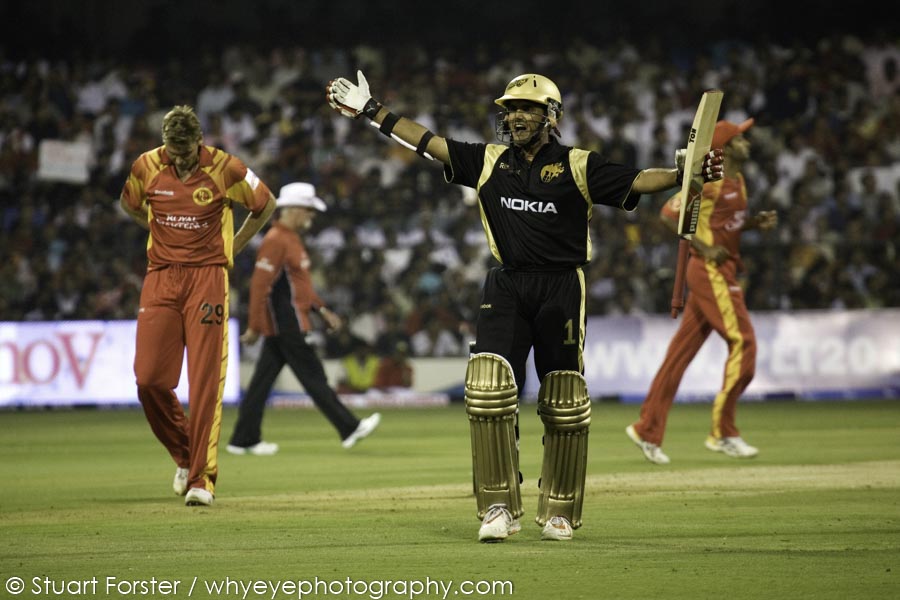
Sourav Ganguly, the team leader of the Kolkata Knight Riders, shouts towards teammates during his innings in the inaugural IPL cricket fixture.
Fittingly, the next edition of the popular Twenty20 competition will be held in 2020 and played between 23 March and 12 May. Sports fans of all ages and nationalities are looking forward to the action returning to cricket grounds across India.
I used Canon cameras and L-series lenses while photographing IPL cricket.
If you like this work on Indian Premier League cricket photography and want to commission a shoot, please give me a call on 07947 587136 or email [email protected] to discuss your photography requirements.
Take a look at other examples of my work on my images of Aberdeen Art Gallery and photography of Kynren at Bishop Auckland posts.
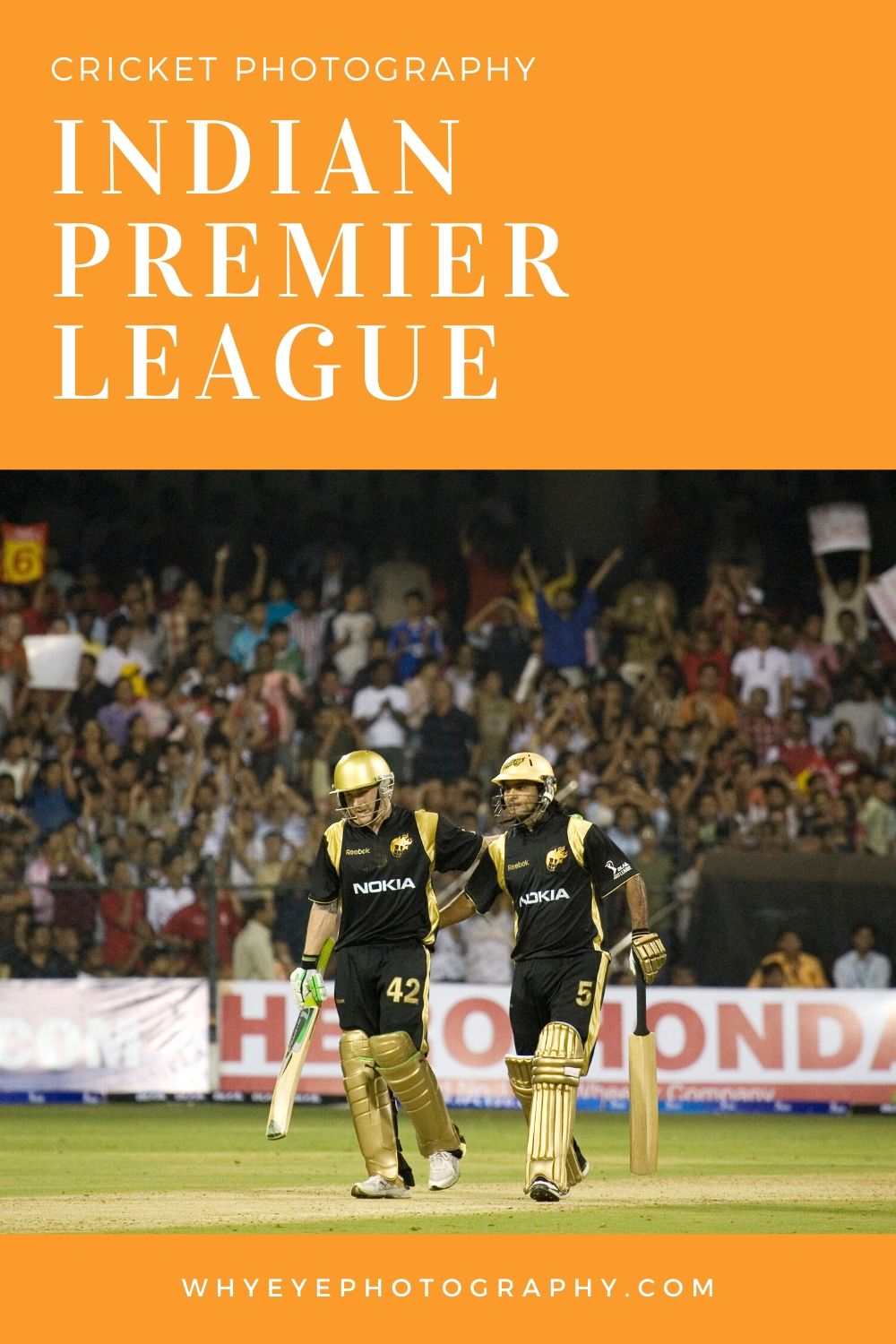
Use Pinterest? Pin this and return to see my photography from the opening Indian Premier League (IPL) fixture.